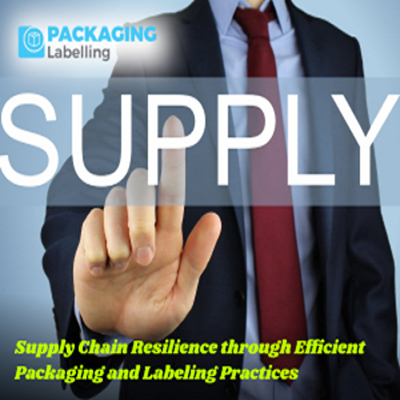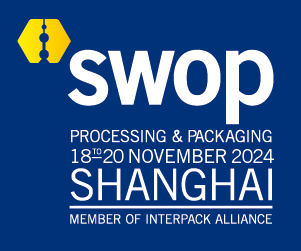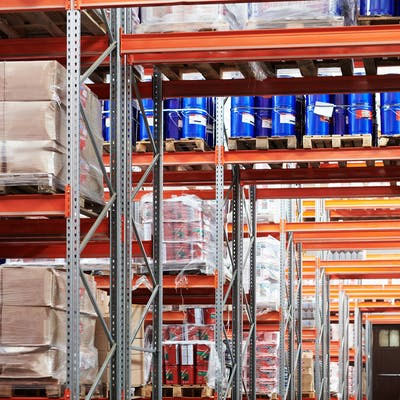Supply Chain Resilience through Efficient Packaging and Labeling Practices

In an era defined by global connectivity and increasing consumer demands, supply chain management has emerged as a critical factor for businesses across various industries. The COVID-19 pandemic of 2020 highlighted the vulnerabilities within global supply chains, emphasizing the necessity for resilience and adaptability. One crucial aspect that significantly contributes to supply chain resilience is efficient packaging and labeling practices. This article delves into the significance of these practices and explores how businesses can leverage them to enhance their supply chain's overall resilience.
Understanding Supply Chain Resilience
Supply chain resilience entails a system's ability to foresee and prepare for possible disruptions, swiftly recover from setbacks, and adjust to changes while maintaining seamless operations. A well-functioning supply chain not only facilitates the uninterrupted movement of goods from producers to consumers but also mitigates risks, curbs expenses, and promotes customer contentment. Consequently, businesses should focus on implementing approaches that bolster the strength and adaptability of their supply chains.
The Role of Efficient Packaging and Labeling Practices
Efficient packaging and labeling practices play a pivotal role in fortifying the resilience of supply chains. In the context of modern business dynamics, packaging goes beyond mere protection of goods during transit; it has become an extension of brand identity and a tool for improving the overall customer experience. Simultaneously, accurate labeling is crucial for compliance with regulatory standards, ensuring product authenticity, and providing consumers with vital information about the product's origin, contents, and usage guidelines.
Key Elements of Resilient Packaging
1. Durable Materials: Choosing resilient and eco-friendly materials for packaging serves a dual purpose. It shields products from harm while also reducing environmental repercussions, aligning with the increasing consumer demand for sustainable practices.
2. Right-sizing Packaging: Adopting packaging that precisely fits the product dimensions minimizes material wastage and reduces transportation costs, contributing to both economic and environmental sustainability.
3. Innovative Design: Incorporating innovative design elements that facilitate easy handling, storage, and transportation can streamline logistics operations and improve the overall supply chain efficiency.
4. Temperature Control and Protection: Ensuring the integrity of perishable goods and sensitive products within the supply chain is crucial. Implementing solutions for temperature control and protection is imperative for industries handling such items. These measures effectively reduce the risks of spoilage and damage, thus maintaining product quality throughout the entire supply chain journey.
| Labeling as a Branding Tool: Strategies for B2B Companies to Stand Out in the Market |
The Significance of Efficient Labeling
1. Regulatory Compliance: Accurate and comprehensive labeling is essential for meeting regulatory requirements, especially in industries such as food, pharmaceuticals, and chemicals, where adherence to specific guidelines is critical for consumer safety.
2. Supply Chain Transparency: Clear and informative labeling fosters transparency within the supply chain, enabling stakeholders and end consumers to track the product's journey from its origin to the point of sale, fostering trust and credibility.
3. Product Authentication and Anti-Counterfeiting Measures: Incorporating advanced labeling technologies such as QR codes, RFID tags, or holographic labels helps in authenticating products and safeguarding against counterfeiting, thereby protecting brand reputation and consumer trust.
4. Consumer Communication: Labels serve as a direct communication channel with consumers, providing them with essential product information, usage instructions, and safety warnings, which can enhance their overall product experience and satisfaction.
Implementing Efficient Practices for Supply Chain Resilience
To foster supply chain resilience through efficient packaging and labeling practices, businesses should consider implementing the following strategies:
1. Collaborative Partnerships: Forming strategic partnerships with packaging suppliers, logistics providers, and labeling specialists can facilitate the adoption of innovative and cost-effective solutions tailored to specific supply chain requirements.
2. Investment in Technology: Integrating advanced technologies such as IoT-enabled sensors, blockchain, and automated labeling systems can streamline the tracking and monitoring of products, ensuring real-time visibility and data-driven decision-making.
3. Sustainability Initiatives: Taking steps towards sustainability is vital in the current business landscape. Embracing eco-friendly packaging materials and practices not only lessens the environmental impact but also resonates with the expanding consumer segment that values environmentally conscious brands and products.
4. Continuous Quality Control: Implementing stringent quality control measures throughout the packaging and labeling process ensures adherence to industry standards, minimizes errors, and enhances product safety and reliability.
Adapting to Evolving Consumer Demands
Consumer expectations and preferences are continually evolving, prompting businesses to adapt their packaging and labeling practices to meet these changing demands. In today's market, consumers are increasingly conscious of sustainability and environmental impact, driving the demand for eco-friendly and recyclable packaging materials. As a result, businesses must prioritize the integration of biodegradable materials, minimalistic designs, and efficient recycling processes into their packaging strategies. Moreover, consumer demands for product transparency, authenticity, and ethical sourcing have amplified the need for comprehensive and informative labeling that highlights a product's origins, manufacturing processes, and ethical standards.
Embracing Digital Transformation in Packaging and Labeling
Digital transformation is profoundly impacting the packaging and labeling landscape, presenting new opportunities for businesses. Technologies such as smart packaging, augmented reality labels, and interactive QR code experiences enable real-time product information for consumers and valuable consumer behavior insights for businesses. Integrating digital tracking and tracing mechanisms within packaging and labeling systems streamlines inventory management, minimizes the risk of counterfeiting, and facilitates prompt responses to supply chain disruptions.
Navigating Global Supply Chain Challenges
Addressing the complexities of global supply chains is a formidable task, given the array of challenges including geopolitical uncertainties, natural disasters, and unpredictable market fluctuations. In this scenario, robust packaging and labeling practices serve as vital shields, allowing businesses to mitigate the effects of supply chain disruptions and maintain uninterrupted product flow. Moreover, standardizing labeling practices internationally streamlines trade simplifies regulatory processes, and fosters stronger relationships among global stakeholders. By proactively integrating resilient packaging and labeling protocols, businesses can confidently navigate the intricacies of the global supply chain with heightened flexibility and assurance.
Conclusion: Building a Sustainable and Resilient Future
In conclusion, the integration of efficient packaging and labeling practices is indispensable for fostering supply chain resilience and addressing the evolving demands of modern consumers. By prioritizing sustainability, innovation, and digital transformation, businesses can not only fortify their supply chains but also establish a competitive advantage in the market. Embracing a holistic approach that combines durable and eco-friendly packaging materials with comprehensive and technologically advanced labeling solutions is essential for building a sustainable and resilient future in an increasingly interconnected and fast-paced global economy.









